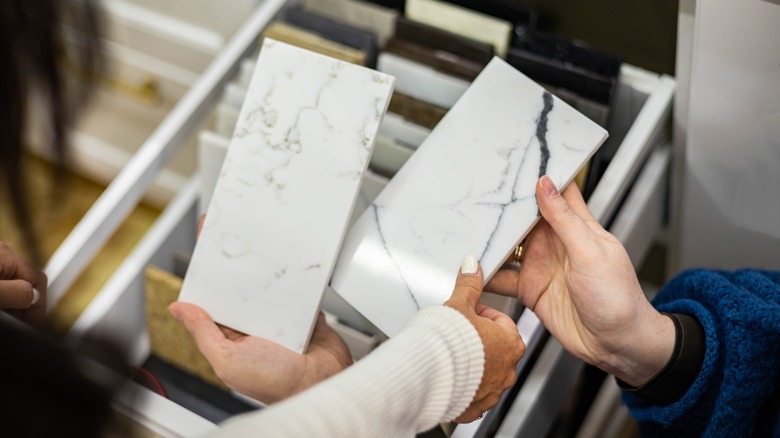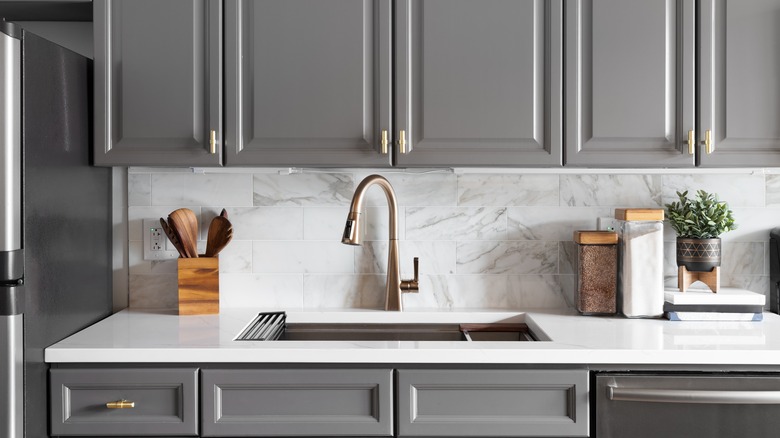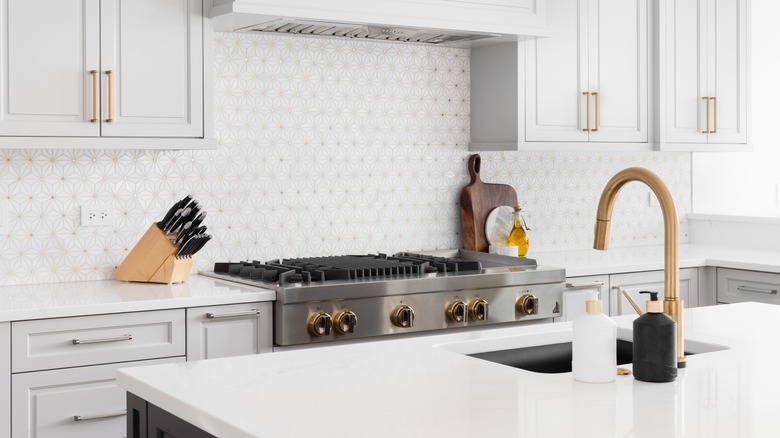Quartz Vs Sintered Stone: Which Countertop Material Is More Durable?
Whether you're actively looking for countertops or just browsing, quartz and sintered stone are two types of countertop you should know. Both materials have plenty of plus points that make them top contenders for your kitchen, including high levels of durability. Both materials also have cons that should be carefully considered. Quartz won't react well to high heat levels, whereas sintered stone is more likely to crack or chip.
On the surface, it can be tricky to narrow down which material would be a better fit for your kitchen. Factors like price, heat resistance, stain resistance, and maintenance/how easy the material is to clean will all help you make your decision. However, if you're looking for countertops that will last for years, durability ranks above all. If you've been wondering which material is more durable, we've rounded up all you need to know so you can make an easier decision about whether quartz or sintered stone is right for your kitchen.
Quartz countertops offer the look of marble without the hassle of upkeep
The cost of quartz countertops will vary. On average, installing this countertop type is priced between $70 and $100 per square foot, with the potential to go up to $200 per square foot. If you have a lot of countertop space to cover, you could be looking at a considerable drain on your kitchen budget. The best thing about quartz countertops is how low maintenance they are. Quartz is non-porous, meaning it won't absorb spills and isn't susceptible to stains. In fact, all you need to do to clean your quartz countertops is use dish soap and water with rubbing alcohol for disinfection purposes.
It's also incredibly tough and won't chip or mark easily, making it a great option for a busy kitchen space. On the other hand, quartz doesn't hold up super well against very high temperatures. If you accidentally put a pan straight from the oven directly onto your countertop, it's likely to cause discoloration. Finally, it's key to note that quartz is not a natural stone product. While this can be a negative for some, the fact it isn't makes it more durable overall.
Sintered stone countertops are resistant to many different areas
Sintered stone countertops cost between $60 to $100 on average per square foot, meaning they could be slightly less expensive than quartz depending on the type you opt for. Like quartz, sintered stone is a non-porous material and doesn't require any kind of sealant. However, sintered stone has the edge on quartz when it comes to heat resistance, and is additionally scratch and stain-resistant as well as safe to use outdoors. Cleaning sintered stone countertops is also simple: you only need a cleaner with a neutral pH and a soft cloth.
If you were to drop a pot on a sintered stone surface, the likelihood is that no mark would be left behind. This goes hand in hand with one of the major downsides of sintered stone countertops, which is that, if you were to drop or accidentally hit something heavy on the edge of the counter, you could find yourself with a cracked or otherwise damaged surface. Overall, despite quartz offering many benefits, sintered stone has more durability when it comes to heat resistance and general durability. Coupled with the fact it can be used in both indoor and outdoor kitchen areas, it will be the better choice for most people.


